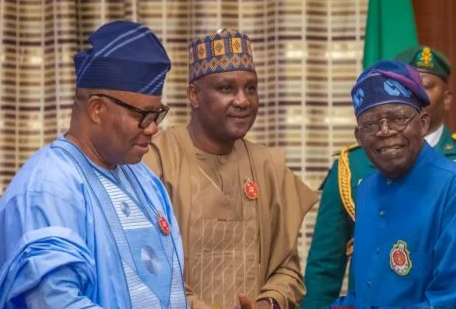President Tinubu Commends National Assembly for Approving Emergency Rule in Rivers State
On March 20, 2025, President Bola Tinubu praised the Nigerian National Assembly for its decisive and patriotic move in approving the State of Emergency proclamation in Rivers State. This unprecedented action comes in response to a protracted political and security crisis that has plagued the state for over 15 months, paralyzing governance and posing a significant threat to national economic stability. In his statement, President Tinubu expressed his gratitude to the National Assembly members for prioritizing the welfare and security of the people of Rivers State above partisan interests and political considerations.
The emergency rule has been positioned as a critical intervention to restore stability in the state, secure vital infrastructure, and safeguard the livelihoods of the people. The President also highlighted the importance of swift action, underscoring the threat that the ongoing crisis in Rivers State posed to the country’s oil and gas industry—key sectors for Nigeria’s economic well-being.
The crisis in Rivers State had reached a breaking point in recent months, with governance collapsing under the weight of political conflict, escalating violence, and a breakdown of law and order. The situation, according to President Tinubu, was jeopardizing the security of vital national assets, particularly in the oil-rich region. The instability in Rivers State also began to spread to neighboring areas, exacerbating tensions and undermining the rule of law.
For over a year, Rivers State had witnessed a protracted political impasse, with multiple factions within the state government and between the state and federal authorities clashing over control and the direction of governance. Local communities faced mounting challenges as insecurity ravaged both urban and rural areas. The state’s political class appeared to be at loggerheads, unable to find common ground, while criminal activities surged, further destabilizing the region.
The President’s statement emphasized that the situation in Rivers had gone beyond a mere political issue; it had become a threat to the integrity of national security, particularly with regard to oil and gas installations—key components of Nigeria’s economic backbone. As the country’s largest oil-producing state, any disruption in Rivers State could lead to significant economic losses, affecting both domestic and international stakeholders.
The National Assembly’s swift approval of the State of Emergency was hailed by President Tinubu as a courageous decision that demonstrated a clear commitment to the national interest. In his statement, he commended Senate President Godswill Akpabio, House of Representatives Speaker Tajudeen Abbas, and all the members of the National Assembly for setting aside partisan differences in favor of the security and well-being of the people of Rivers State.
“Today’s decision exemplifies what our nation can achieve when unity of purpose and patriotism guide the action of leaders. We remain steadfast in pursuing a safer, more prosperous Nigeria—one where every citizen’s potential is safeguarded and nurtured,” President Tinubu said. He further acknowledged that the emergency rule would empower the newly appointed Sole Administrator to restore order in the state, addressing systemic breakdowns and facilitating dialogue among conflicting parties.
By approving the State of Emergency, the National Assembly provided the necessary legislative backing to enable the federal government to implement immediate measures to stabilize the state, such as the establishment of a temporary central authority that can make decisions and direct resources where they are most needed. This move effectively sidelines the existing state government for the time being, placing the responsibility for governance in the hands of the Sole Administrator, who is expected to take steps toward restoring law and order and re-establishing democratic structures.
The Sole Administrator’s role in this emergency period is critical to the immediate recovery of the state. President Tinubu emphasized that the six-month emergency rule would give the Sole Administrator the power to stabilize the region, address systemic failures, and restore confidence in local governance. The Sole Administrator will have the mandate to initiate reforms, build peace, and engage with all stakeholders, including political leaders, civil society groups, and the general population, to ensure that the root causes of the conflict are addressed.
While the Sole Administrator will have significant authority, the overarching goal is to restore democratic accountability in the state. The administration has made it clear that the emergency rule is a temporary measure, with the long-term objective being to return governance to the people through free and fair elections once the situation has been stabilized. The hope is that this will prevent further escalation of violence and bring a sustainable solution to the ongoing crisis.
The President further reassured Nigerians that the emergency measure would not lead to an indefinite suspension of democracy. Instead, the intervention would create the space necessary for peace-building, reconciliation, and the eventual restoration of democratic governance in Rivers State.
The approval of the State of Emergency in Rivers State represents a significant turning point in Nigerian politics, not only in terms of the immediate governance issues in the state but also in terms of national unity and stability. President Tinubu’s remarks underscored the importance of collective action in times of national crisis, pointing out that the situation in Rivers State had become a test of the country’s ability to overcome internal divisions for the greater good.
The crisis in Rivers had exposed the vulnerability of the nation’s governance structures, as local political squabbles led to broader regional and national instability. The President’s emphasis on unity of purpose and patriotism highlights the need for all Nigerian leaders to work together, particularly when the national interest is at stake. This is a theme that President Tinubu has consistently highlighted since taking office: that Nigeria’s challenges can only be overcome if political leaders, from all regions and backgrounds, prioritize the collective well-being of the nation over partisan interests.
Rivers State plays a crucial role in Nigeria’s national security and economy. As the country’s primary oil-producing state, the stability of Rivers is vital not only for the local economy but also for the national and international markets that rely on Nigeria’s oil exports. The disruption of operations in the oil sector, particularly in such a key region, would have far-reaching consequences for the country’s economic health.
In his statement, President Tinubu acknowledged that the situation in Rivers posed a significant risk to national economic security. The attacks on critical infrastructure, including oil pipelines and gas installations, as well as the growing insecurity that had plagued the region, threatened to further exacerbate Nigeria’s economic challenges. These security concerns had already led to a decline in production, as multinational oil companies began pulling back from their operations in the state due to safety fears.
The emergency measures introduced by the federal government, through the State of Emergency, are expected to restore stability to the region, protect critical national assets, and ensure that oil production continues without further disruptions. In a time when Nigeria is working hard to diversify its economy and improve its fiscal health, the preservation of oil revenues remains a cornerstone of the country’s economic strategy. The situation in Rivers could have had far-reaching implications, not only for the state but for the broader economy, making the intervention of the National Assembly and President Tinubu critical to safeguarding Nigeria’s economic future.
While the immediate focus is on stabilizing Rivers State and restoring law and order, President Tinubu emphasized that the longer-term objective is to ensure that the people of the state are able to govern themselves democratically and peacefully. The Sole Administrator will have the challenging task of rebuilding trust between the people and the government, as well as ensuring that justice is served for those responsible for the unrest.
Restoring Rivers State to a state of peace and stability will require ongoing dialogue and reconciliation efforts, not just between political elites but also among local communities and various interest groups. The federal government has expressed its commitment to supporting these efforts, ensuring that the necessary resources and institutional support are in place to facilitate sustainable peace in the state.
President Tinubu’s administration has reiterated that it remains committed to working closely with the National Assembly, state governments, and other stakeholders to ensure that Nigeria emerges from this crisis stronger and more unified. By focusing on inclusive development, promoting dialogue, and fostering greater cooperation between all arms of government, the administration hopes to address the root causes of the conflict and create a more stable and prosperous Nigeria for all citizens.
The National Assembly’s approval of the State of Emergency in Rivers State is a significant and bold step towards restoring stability in the region. President Tinubu’s recognition of the National Assembly’s actions underscores the importance of unity and national interest in times of crisis. With the six-month emergency rule in place, the Sole Administrator will work to stabilize the state, safeguard critical infrastructure, and facilitate dialogue among conflicting parties. The federal government’s commitment to a return to democratic governance once stability is restored provides hope for the future of Rivers State and Nigeria as a whole.
As Nigeria moves forward, the ongoing collaboration between the federal government, National Assembly, and the people of Rivers State will be key to ensuring that the country emerges from this crisis stronger and more resilient. Through these efforts, Nigeria can continue its journey toward peace, economic prosperity, and democratic accountability.
Source: LIB





